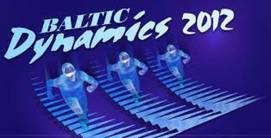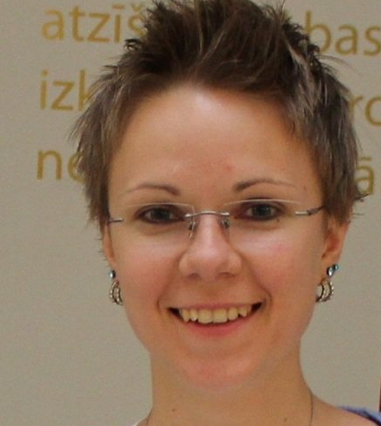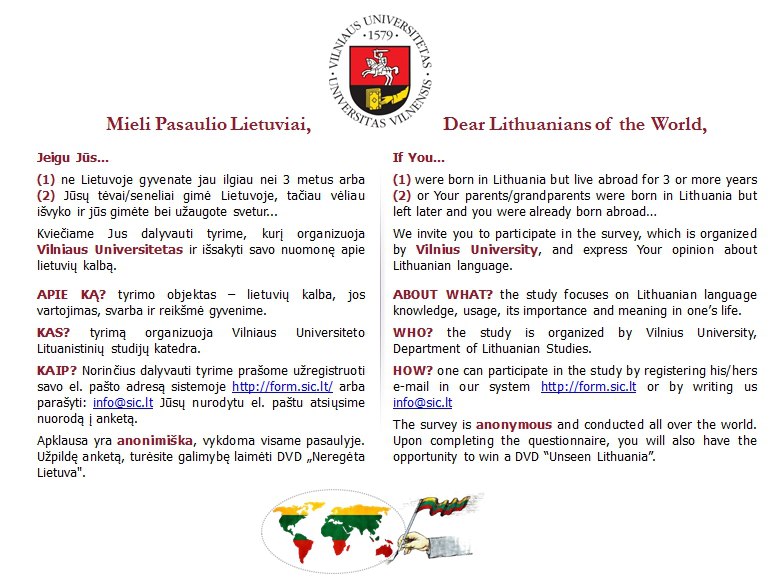
THE VOICE OF INTERNATIONAL LITHUANIA
|
VilNews has its own Google archive! Type a word in the above search box to find any article.
You can also follow us on Facebook. We have two different pages. Click to open and join.
|
Archive for September, 2012
- Posted by - (0) Comment
Estonia is an
economic oasis

“The whole Northern Europe and Estonia are some sort of an oasis. It’s a fact that other economies elsewhere are doing much worse than Scandinavia and Estonia. We are enjoying this situation and praying that is remains like that,” Jüri Käo, one of Estonia’s most powerful businessmen, told the newspaper Äripäev.
Käo added that he is fairly optimistic about the economy’s future. “The feeling is more positive because there are stronger signs that Greece will not bring about a collapse because this could turn everything upside down.”
Speaking of fourth quarter, Käo said that the sales are expected to be high in the fourth quarter. “This is when most sales companies earn their biggest income. Since people’s confidence is growing and income is increasing, I would dare to forecast even 3 percent growth,” he added.
Käo: Estonia is an economic oasis ![]()
Rehe: Estonia riding a Scandinavian wave ![]()
- Bookmark :
- Digg
- del.icio.us
- Stumbleupon
- Redit it
- Posted by - (0) Comment
3 UPCOMING CONFERENCES:
![]()
Baltic Dynamics 2012
September 13th - 14th in Vilnius

We would like to attract your attention to the international conference
„BALTIC DYNAMICS 2012 : THE ROLE OF SCIENCE AND TECHNOLOGY PARKS IN SUPPORTING ENTREPRENEURIAL COMMUNITY“
which takes place in Vilnius Radisson BLU Hotel (Konstitucijos 20) on September 13th and 14th, 2012.
The conference will present the newest facts on innovation and business / SMEs in the Baltic, as well as detailed discussions on public entrepreneurial support, the role of science and technology parks, intellectual property management, international cooperation in the field of innovation, among others.
- Bookmark :
- Digg
- del.icio.us
- Stumbleupon
- Redit it
- Posted by - (0) Comment
![]()
Lithuania: Your strategic
gateway to Europe
September 21st in Chicago

The annual World Lithuania Economic Forum (WLEF) this year takes place in Chicago September 21st. This year's conference is entitled Lithuania: Your Strategic Gateway to Europe.
The conference will convene business professionals from corporations that have operations in, or looking to establish operations in Lithuania; senior-level government officials responsible for attracting FDI to Lithuania; and entrepreneurs exploring opportunities in Lithuania.
- Bookmark :
- Digg
- del.icio.us
- Stumbleupon
- Redit it
- Posted by - (0) Comment
![]()
Baltic Investors Forum
October 25th - 26th in Vilnius

Mark your calendar to make sure you attend the first Baltic Region Investors Forum.
The two-day international event of the highest level for business international development, investment promotion and future economic prospects already presents over 30 prominent speakers.
For the first time in Baltics:
Dr. Nouriel Roubini,Co-founder and Chairman, Roubini Global Economics
Mr. Richard C. Koo,Chief Economist, Nomura Research Institute
- Bookmark :
- Digg
- del.icio.us
- Stumbleupon
- Redit it
- Posted by - (1) Comment
 |
FROM JANUARY 2006 Opposition leader Andrius Kubilius “LITHUANIA NEEDS A VISIONARY STRATEGY” |


- Bookmark :
- Digg
- del.icio.us
- Stumbleupon
- Redit it
- Posted by - (0) Comment

Gazprom under EU
antitrust investigation
- Lithuania rejoices
When the European Commission announced Tuesday night that it is investigating Russia’s OAO Gazprom for potential abuse of its dominance in the natural gas markets of eight Central and Eastern European states, Lithuania likely rejoiced more than others. The small Baltic country has been at the forefront of the European Union’s struggle against overdependence on Russian natural gas supplied by state-owned Gazprom.
“This is very important, first of all for Lithuania,” Energy Minister Arvydas Sekmokas told Real Time Brussels in an interview Wednesday. Lithuania, along with several other small EU countries, depends on Russia for virtually all its gas supplies, putting Gazprom into an unusually strong position.
- Bookmark :
- Digg
- del.icio.us
- Stumbleupon
- Redit it
- Posted by - (0) Comment
|
New school year – Lithuanian schoolchildren have again put on their uniforms. Laughter and playful children fill the streets, squares and classrooms. Lithuanian school has undergone many changes since the Soviet Union's fall, but many feel that improvements are too slow. Write to us if you have an opinion on what should be done with education in this country! Send to editor@VilNews.com |
 |
Future of Lithuanian education:
Innovation and creativity

Minister of Education and Science
Gintaras Steponavičius
By: Minister of Education and Science, Gintaras Steponavičius
Starting the new school year, our focus of attention remains the same – fostering innovation and creativity.
- Bookmark :
- Digg
- del.icio.us
- Stumbleupon
- Redit it
- Posted by - (2) Comment
Future of Lithuanian education:
Innovation and creativity

Minister of Education and Science
Gintaras Steponavičius
By: Minister of Education and Science, Gintaras Steponavičius
Starting the new school year, our focus of attention remains the same – fostering innovation and creativity.
More freedom to schools
Last year our schools started to work according to new curriculum programmes based on promoting practical use of knowledge and developing skills of independent learning. Our aim is to create an educational basis enabling kids not only to gain knowledge, but also to know, how to use it in practice. New programmes allow schools and teachers to choose the learning content, to decide what and how to teach.
Lithuanian schools possess high level of academic excellence and the credit goes to hardworking teachers and pupils. They continually win medals at international Olympiads. A graduate of a Kaunas gymnasium became the best young scientist of the European Union in 2011.
Electronic backpacks for fifth-graders
The Ministry of Education and Science plans to provide around 100 schools with tablet computers, they will be used by up to 10 thousand fifth-graders. Last year only, three educational websites were created for 5 to 8-graders where pupils can learn natural sciences and Lithuanian language by playing and conducting virtual experiments. In addition to virtual laboratories, classrooms of gymnasiums and secondary schools were supplied with new teaching resources for art and technology classes and state of the art laboratory equipment for natural sciences.
Almost 80 percent of the schools in Lithuania have exchanged the regular paper grade books for electronic ones. During the last 4 years, there was an explosion of electronic grade books. In this area we are leaders not only among the countries of our region, but also in Europe.
Electronic grade books not only lighten workload for teachers. They can be accessed online by parents and house school records, including grades, assignments, progress, attendance, schedules, as well as teacher notes.
Better access to after school activities
Unfortunately, as a result of demographic crisis, less kids come to school every year and we are faced with the necessity to close some smaller schools. At the same time, new educational opportunities arise. This year in rural areas 36 multifunctional community centers will open the doors, among other functions they can serve as pre-, primary or basic schools.
It is very important to make our classrooms vibrant, to give our kids access not only to interactive learning, but also to educational after school activities. Starting this October, 4 municipalities will test-drive non-formal education vouchers. We expect the new finance model to allow better access to after school activities, the percentage of children involved is expected to rise from 20 to 50 percent.
Professional development opportunities for teachers
Professional training and retraining for teachers is another area where investments are crucial. During next couple of years, over 8 thousand teachers will be able to participate in different training activities. Special attention is being paid to starting teachers.
Teachers today face a great challenge to help children, growing up under constant information, data and technology siege, not to loose natural keenness to be creative, to generate and implement new ideas, to keep individual outlook.
Communication Department
Ministry of Education and Science
www.smm.lt
info@smm.lt
- Bookmark :
- Digg
- del.icio.us
- Stumbleupon
- Redit it
- Posted by - (0) Comment
- Bookmark :
- Digg
- del.icio.us
- Stumbleupon
- Redit it
- Posted by - (1) Comment
 |
FROM NOVEMBER 2006 THE STATE’S EDUCATION IN A BAD SHAPE |




- Bookmark :
- Digg
- del.icio.us
- Stumbleupon
- Redit it
- Posted by - (0) Comment
When Donna heard that her English teacher was going to give daily
quizzes on Harper Lee’s novel To Kill a Mockingbird, she panicked;
“I can’t take tests, my
mind just goes blank”

By: Dr. Boris Vytautas Bakunas, PhD
When Donna heard that her English teacher was going to give daily quizzes on Harper Lee’s novel To Kill a Mockingbird, she panicked. “I can’t take tests,” she blurted out. “My mind just goes blank.”
On test days, twelve-year-old Andrew could hear his heart pounding the moment he walked through the classroom door. As his muscles tensed and his stomach churned, he felt increasingly anxious and confused.
- Bookmark :
- Digg
- del.icio.us
- Stumbleupon
- Redit it
- Posted by - (10) Comment
When Donna heard that her English teacher was going to give daily
quizzes on Harper Lee’s novel To Kill a Mockingbird, she panicked;
“I can’t take tests, my
mind just goes blank”

By: Dr. Boris Vytautas Bakunas, PhD
When Donna heard that her English teacher was going to give daily quizzes on Harper Lee’s novel To Kill a Mockingbird, she panicked. “I can’t take tests,” she blurted out. “My mind just goes blank.”
On test days, twelve-year-old Andrew could hear his heart pounding the moment he walked through the classroom door. As his muscles tensed and his stomach churned, he felt increasingly anxious and confused.
Worldwide, tens of millions of students at the elementary, secondary, and university levels suffer from debilitating test anxiety. In fact, researchers have discovered that the longer students stay in school, the more likely they are to become test anxious.
Educational psychologists Paul Eggen and Don Kauchak have defined test anxiety as “a relatively stable, unpleasant reaction to testing situations that lowers performance.” In many instances, test anxiety can become so severe that it leads to academic failure, loss of self-esteem, and missed educational and career opportunities.
Test anxiety is not just limited to students. Many highly-accomplished, successful adults also dread taking tests. When the editors of Esquire magazine invited some of New York’s leading cultural celebrities to a fancy Manhattan hotel to take the Scholastic Aptitude Tests as part of a feature article they were planning, only P. J. O’Rourke, at that time the editor of the satirical magazine the National Lampoon, agreed. How did some of the others respond?
David Halberstam, American Pulitzer Prize-winning journalist, author, and historian recoiled in horror. “That’s the cruelest idea I ever heard of since the Chinese water torture!”
Gail Sheehy, best-selling author of Passages and 15 other books, cried out, “Oh, Jesus! Oh God! I don’t think I can take this.”
The Two Faces of Test Anxiety
Psychologists now recognize two sides to test anxiety: emotionality and worry. Physically we experience emotionality in several ways, including muscular tension, rapid pulse, dry mouth, upset stomach, and even nausea.
As distressing as these physical symptoms feel, they are relatively benign when compared to the real culprit in test anxiety – worry.
When test anxious students – and adults – fill their minds with thoughts about the consequences of failure and the embarrassment it would cause, they have little attention space in their working memories to devote to problem-solving.
Working memory is that part of the mind that does verbal and nonverbal tasks such as reasoning and comprehension. It has often been likened to a computer screen because it is where conscious information-processing occurs. And just like the computer screen on your desk, it has a limited capacity. The average adult can hold about seven (plus or minus two) unrelated bits of information in mind at any one time. A second important limitation is that a person cannot perform two unrelated mental tasks simultaneously. Just try to say the words of a song you know by heart out loud while adding a pair of two-digit numbers like 37 plus 45, and you will see how reciting the lyrics blocks your ability to solve the addition problem.
When people suffering from test anxiety fill their minds with task-irrelevant cognitions like “What if I fail? I couldn’t bear it!” or “What makes me think that I’m smart enough to write a dissertation,” they overload their minds with distracting and useless information. To extend the computer analogy, it’s as if they fill their minds with malware, and their minds operate in a slow, sluggish fashion, or even appear to shut down completely.
Recognizing Test-Anxious Students
Sometimes test-anxious students are easy to spot. Consider the experience of Robert, a chemistry teacher at a suburban high school in the United States, who had been assigned the job of monitoring ACT testing for students aspiring to gain admission to college.
”An hour into the exam, one kid got sick to his stomach and ran to the bathroom to vomit. Several others complained of very bad headaches. One nearly fainted.”
Some of the signs of test anxiety are behavioral. Whenever Matthew took a test, he charged into it like a racehorse. When the rest of the class had barely finished writing their names on their papers, Matthew would be handing his in. Asked if he studied, he muttered, “Yeah, sort of.”
Cynthia was just the opposite. Give her a test, and you would have to pry it loose from her fingers. A close look at one of her math tests showed that she utterly failed to budget her time. The first few problems were done in great detail while the rest where skipped altogether.
Students like Matthew avoid study and test-taking situations, while those like Cynthia are immobilized with fear by them. Several studies of test-anxious students have shown that as a group, they lack study and test-taking skills. Because they display many of the behaviors of students who lack self-discipline, these test-anxious students are frequently overlooked. In addition, some teachers simply refuse to admit that test anxiety is a real phenomenon, insisting that it is no more than an excuse for laziness. Yet ask these teachers how they feel when their teaching is being evaluated by a school principal or department chair, and they readily admit to being extremely nervous.
What Teachers Can Do to Help
Before giving a test, make sure that your classroom is quiet, well-lit, and free of distractions. Post a sign on your classroom door saying “Testing in Progress” and directing visitors to return later.
Stock your classroom with extra pencils, pens, calculators, and other materials your students may need. Teach your students an orderly procedure to follow in obtaining these items.
Allow time to review the day before and immediately prior to a test. Quiz students on key terms, concepts, and applications. Give them a chance to leaf through their texts and ask you questions they think might be on the test. Also, provide pointers on how they can identify important content, e.g., italicized terms, chapter sub-headings, and tables and graphs.
Give practice tests. Uncertainty is a breeding ground for anxiety. Students who know what expect are much less likely to worry.
During tests, give clear and precise instructions. For example, if you require that students answer questions using complete sentences, tell them so explicitly and emphatically. Write a sample complete-sentence response on the board next to one that is incomplete, and highlight the difference.
Give untimed tests. In one study, test anxious fifth and sixth graders made three times the number of computations errors when asked to solve simple arithmetic problems than they did when time pressure was removed. If a few students are still working when the class period ends, allow them to finish at a later prearranged date.
Use different kinds of assessment and a variety of test formats. This will improve the accuracy of the semester grades you obtain from your students. It will also give them a wide range of test-taking experiences.
After tests, avoid social comparisons and public displays of grades. Use high-frequency errors to re-teach concepts, principles, or operations students have failed to master. Analyze common mistakes with the class and show how they can be corrected.
Interview students who have done poorly. Ask them how they prepared for the test and what they can do to improve their performance next time. Some schools offer free tutoring for students who need extra help.
Teach study and test-taking skills as formal lesson plans. You’ll be surprised at how many students, even at the university level, fail to engage such basic strategies as systematically reading directions or reading all potential responses on multiple choice tests before answering. Among other skills, I recommend teaching students how make and use flashcards to learn important terms, how to highlight key sentences that convey main ideas as well as summary paragraphs. Be sure to allow your students time to practice the study skills you have taught during class sessions so that you are there to verify that they actually study and can offer help when needed. Pairing students with a study partner and allowing them to quiz each other the day before a test will make studying more enjoyable and effective. Once students see from their own experience that studying improves their grades, you can gradually phase out the time you devote to studying in class.
Keep your eyes open for signs of test anxiety. If a student appears frustrated or extremely tense, approach and offer assistance. Many students want help, but are afraid to ask. Be on the lookout for such warning sighs as rushing through tests, dawdling over a single difficult question, and complaining of stomachache, headache, or dizziness before a test.
No matter what you do, there will still be students who need more assistance to manage test anxiety than you can give in a regular classroom. Refer such students to their counselors or school psychologists for help. Also, contact the parents and tell them that their children may be suffering from test anxiety. Ask if the students are bringing textbooks home to study and check if they have a quiet place to study without interruption. Also, caution parents to avoid placing too much pressure on their children.
In many parts of the world, students and teachers are under enormous pressure to raise test scores. Ironically, such pressure may actually lower the scores of anxiety-prone students. By learning more about test anxiety yourself, and by creating a classroom climate in which the need to achieve does not subvert your primary goals – helping your students learn the content you teach and develop a positive attitude toward learning – you will help them develop learning and coping skills that they will help them for the rest of their lives.
References:
Bakunas, B. (1993). Putting the lid on test anxiety. Learning, 22, 64-65.
Eggen, P. E. & Kauchak, D. (1977). Educational Psychology: Windows on Classrooms. Upper Saddle River, NJ: Prentice Hall.
Hill, K. T. (1984). Debilitating motivation and testing: A major educational problem – possible solutions and policy applications: In R. Ames & C Ames (Eds.) Research on Motivation in Education (pp. 245-274). New York: Academic Press.
Ottens, A.J. (1984). Coping With Academic Anxiety. New York: Wilson.
Spielberger, C.D. & Vagg, P.R. (1995). Test anxiety: Theory, Assessment, and Treatment. Bristol, PA: Taylor & Francis.
Williams, Janice E. (1996). “Gender-Related Worry and Emotionality Test Anxiety for High-Achieving Students.” Psychology in the Schools; v33 n2 p159-62.
Zeidner, M. (1998). Test anxiety: The State of the Art. New York: Plenum.
 |
Dr, Boris Vytautas Bakunas is an educational psychologist and independent consultant specializing in individual and group performance improvement. His article “Helping Students Overcome Test Anxiety,” is based on a graduate, professional-development course he developed, which he teachers through St. Xavier University/International Renewal Institute. |
- Bookmark :
- Digg
- del.icio.us
- Stumbleupon
- Redit it
- Posted by - (0) Comment
Are you of Lithuanian descent, living abroad?
Tell us about your skills
in Lithuanian language

Darja Lyzenko
By Darja Lyzenko, SIC
darja.lyzenko@sic.lt
Together with Vilnius University our research company is currently carrying out a research study about the language skills and usage of Lithuanian descent people residing outside of Lithuania. We are looking for Lithuanians who (1) currently live somewhere other than Lithuania for more than 3 years, also (2) who left Lithuania either by themselves or with their parents, or (3) whose parents or grandparents left Lithuania before they were born, i.e. who were born outside of Lithuania.
- Bookmark :
- Digg
- del.icio.us
- Stumbleupon
- Redit it
- Posted by - (0) Comment
Are you of Lithuanian descent, living abroad?
Tell us about your skills
in Lithuanian language

Darja Lyzenko
By Darja Lyzenko, SIC
darja.lyzenko@sic.lt
Together with Vilnius University our research company is currently carrying out a research study about the language skills and usage of Lithuanian descent people residing outside of Lithuania. We are looking for Lithuanians who (1) currently live somewhere other than Lithuania for more than 3 years, also (2) who left Lithuania either by themselves or with their parents, or (3) whose parents or grandparents left Lithuania before they were born, i.e. who were born outside of Lithuania.
The survey is conducted via internet all over the world. We would therefore appreciate any help in spreading the information about this study. In case you have your community forum/Facebook account or send newsletters to the community members - we have prepared a flyer (see below) with short text information about the survey in both - English and Lithuanian. We are also kindly inviting you personally to register and participate in the survey.
Darja Lyzenko
Tel: +370 5 2054 524 Fax: +370 5 2054 501
Greenhall, Upės g. 21, LT-08128 Vilnius
www.sic.lt

- Bookmark :
- Digg
- del.icio.us
- Stumbleupon
- Redit it
- Posted by - (0) Comment
Vilnius University during
“Soviet Times”

Excerpt from Tomas Venclova’s book “Vilnius a Personal History”.
I entered the University shortly after Stalin’s death. I was sixteen years old, one of the youngest students there. Times had somewhat improved―become more “vegetarian,” to quote Anna Akhmatova. The war against the anti-Communist Lithuanian and Polish partisans was coming to an end, most of them having been killed. The deportations had stopped, and people―though not all, by far―were coming back from Siberia and the prisons. Yet grim Soviet conditions still prevailed.
- Bookmark :
- Digg
- del.icio.us
- Stumbleupon
- Redit it
VilNews e-magazine is published in Vilnius, Lithuania. Editor-in-Chief: Mr. Aage Myhre. Inquires to the editors: editor@VilNews.com.
Code of Ethics: See Section 2 – about VilNews. VilNews is not responsible for content on external links/web pages.
HOW TO ADVERTISE IN VILNEWS.
All content is copyrighted © 2011. UAB ‘VilNews’.

 Click on the buttons to open and read each of VilNews' 18 sub-sections
Click on the buttons to open and read each of VilNews' 18 sub-sections 


















.jpg)



